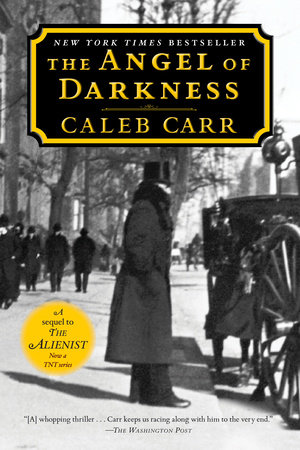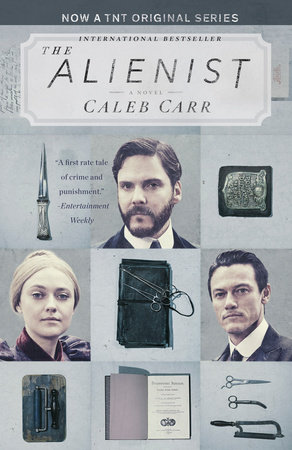Excerpt
The Angel of Darkness: Book 2 of the Alienist
CHAPTER 1June 19th, 1919
There’s likely some polished way of starting a story like this, a clever bit of gaming that’d sucker people in surer than the best banco feeler in town. But the truth is that I haven’t got the quick tongue or the slick wit for that kind of game. Words haven’t figured much in my life, and though over the years I’ve met many of what the world counts to be the big thinkers and talkers of our times, I’ve stayed what most would call a plain man. And so a plain way of starting will suit me well.
The first thing to do, along these plain lines, is to say why I’ve closed the shop up and come into the back office on a night when there’s still plenty of business that might be done. It’s a fine evening, the kind what I used to live for: a night when you can take in all the affairs of the avenue with nothing more than your shirtsleeves for cover, blowing the smoke of a dozen good cigarettes up to the stars above the city and feeling, on balance, like maybe there’s some point to living in this madhouse after all. The traffic—gasoline-powered automobiles and trucks these days, not just clattering old nags dragging carriages and carts—has slowed quite a bit with the passing of midnight, and soon the after-supper ladies and gents will be over from the Albemarle Hotel and the Hoffman House to pick up their fine-blended smokes. They’ll wonder why I’ve closed early, but they won’t wonder long before heading for some other shop; and after they’ve gone, quiet will settle in around this grand Flatiron Building with a purpose. She still lords it over Madison Square, the Flatiron does, with her solitary, peculiar silhouette and her fussy stone face, all of which, at the time she was built, had architects and critics going at each other tooth and nail. The Metropolitan Life Tower across the park may be taller, but it doesn’t have near the style or presence; and next to the Flatiron, buildings like Madison Square Garden, topped by its once-shocking statue of naked Diana, just seem like hangovers from another age, an age that, looking back, feels like it passed in the space of a night. It was a gay night, many folks’d say; but for some of us, it was a strange and dangerous time, when we learned things about human behavior that most sensible people would never want to know. Even the few that might’ve been curious got all the grimness they could stand from the Great War. What people want now’s a good time, and they want it with a vengeance.
Certainly that drive is what’ll be powering the type of folks who’ll be on their way over to my shop to try and buy the smokes they’ll need for long hours at the city’s gaming tables and dance halls. The weather alone would rule out any darker, motivations. The breezy, light arms of the night air will wrap themselves around all those keen, hopeful souls, and they’ll tear into the town like a meat district dog who’s smelled out a bit of bone at the bottom of an ash heap. Most of their activities won’t amount to nothing, of course, but that doesn’t matter; part of the strange fun of getting rooked into thinking that anything’s possible on the beaten, dirty streets of this Big Onion is knowing that if you don’t find what you’re looking for tonight, it’s all that much more important that you try again tomorrow.
I remember that feeling; I had it many times myself before I reached my present lamentable state. Being forever on the verge of coughing up a lung has taken away much of my joy in this existence, for it’s hard to relish the world’s pleasures when you’re leaving pools of blood and pus wherever you go like some wretched, wounded animal. Still, though, my memory’s as good as ever, and to be sure, I can recall the raw joy that nights like this used to bring, the feeling of being outside and on your own, with the whole world stretched out and waiting. Yes, even with the hack I know that you don’t come in from a night like this without a damned good reason. But that’s exactly what Mr. John Schuyler Moore has given me.
He came in about an hour ago, drunk as a lord (which will surprise exactly nobody what knows the man) and spewing a lot of vitriol about the cowardice of editors and publishers and the American people in general. To hear him talk (or maybe I should say, to hear the wine and whiskey talk), it’s a miracle this country’s made it as far as we have, what with all the secret horror, tragedy, and mayhem that infest our society. Mind you, I don’t argue the man’s point; I spent too many years in the house and employ of Doctor Laszlo Kreizler, eminent alienist and friend to both me and Mr. Moore, to write my guest’s gloomy estimations off as a drunkard’s ravings. But as oftentimes happens with your inebriates, my visitor wasn’t going to let his bitterness stay generalized for too long: he was looking for somebody specific to go after, and in the absence of anybody else it was pretty obvious that I’d do.
His particular complaint had to do with the book he’s been writing these last several months, ever since President Roosevelt died. I read the thing, we all did; gave Mr. Moore our thoughts on it, and wished him well; but there wasn’t one of us, including the Doctor, what seriously believed he had a prayer of finding a publisher for it. The manuscript told the tale of the Beecham murders, the first case that the Doctor, Mr. Moore, Miss Sara Howard, the two detectives Isaacson, Cyrus Montrose, and I had occasion to undertake together: not the sort of tale that any publisher in his right mind is going to place before the public. True, there’s them what likes to get a little scare out of their evening read; but there’s also a limit to how far that particular taste goes, and the Beecham tale was as far over that limit as you could likely get, in this day and age. Maybe it is a story that needs telling, like Mr. Moore claims; but there’s plenty of stories that need telling what never get told, just because people can’t bear the listening.
My first mistake this evening was to make that little observation to Mr. Moore.
He gave me what’s a rare look, for him: hard and truly angry. I’ve known John Schuyler Moore since I was eleven years old, which would be some twenty-four years, and I would be hard-pressed to name a fairer, more decent, or generally kinder man. But he does run deep, and like most that do, there’s a pool of hurt and bitterness inside him that sometimes can’t help but stream on out. I’ve seen different things bring it on, but it’s never been stronger than tonight: he wanted the Beecham story heard, and he was in a genuine rage with all them what were going to prevent him from telling it, not to mention anybody that might even try to understand such skittishness. Which in this case—unfortunately—was me.
He isn’t young any longer, Mr. Moore isn’t, and the ruddy ripples of skin around his starched collar tell of how he’s lived his life; but in the angry eyes was the same fire that’s always driven him when faced with injustice and what he sees as stupidity. And the man doesn’t back down at sixty-odd years any more than he did when he was my age. Knowing all this, I figured a fine airing of opinions was on its way, and I climbed up one of the wooden ladders in the store to fetch a large jar that contains a particularly pricey mix of Turkish and Georgian leaves. Then I set a second wicker chair out under the little striped canopy that covers my two front windows—S. TAGGERT, TOBACCONIST, FINE FOREIGN AND DOMESTIC BLENDS in the best gold leaf—and set to work rolling the goods in my tastiest English papers. In that setting the two of us had at it, the May breeze continuing to carry the nastier smells of the city off to points east.
“So, Stevie,” declares the great journalist himself, in the same tone of voice what’s gotten him fired off newspapers up and down the East Coast, “I take it that in the end you, too, are going to prove a willing partner to the conspiracy of silence that surrounds the private horrors of American society.”
“Have a smoke, Mr. Moore,” answers yours truly, the unaware conspirator, “and think about what you just said. This is me, Stevie, the same what has gone on ungodly pursuits like the Beecham case with you since he was a boy.”
“That’s who I thought I was talking to,” comments my companion unsteadily, “but your tone led me to wonder if I might not be mistaken.”
“Light?” says I, whipping a match against my pants as Mr. Moore fumbles in his pockets. “It ain’t that you’re mistaken,” I go on, “but you’ve got to know how to approach people.”
“Ah!” says he. “And so now I, who have worked for the finest journals in this country, who currently comment on the greatest affairs of the day in the pages of
The New York Times, now I do not know how to approach my public!”





